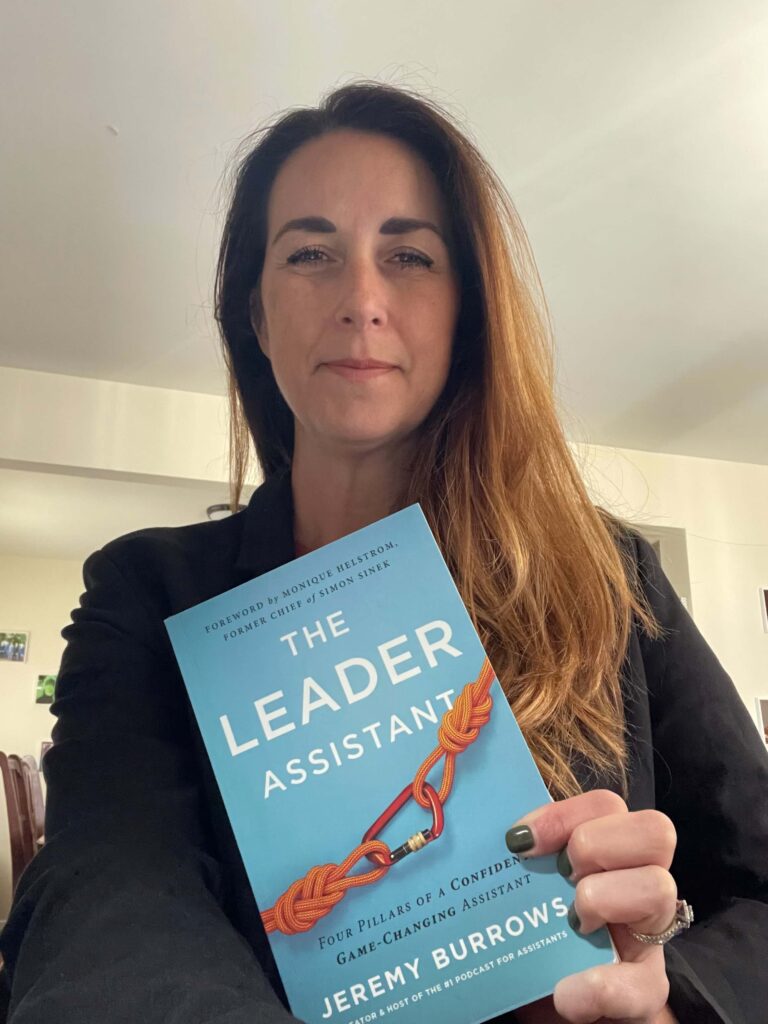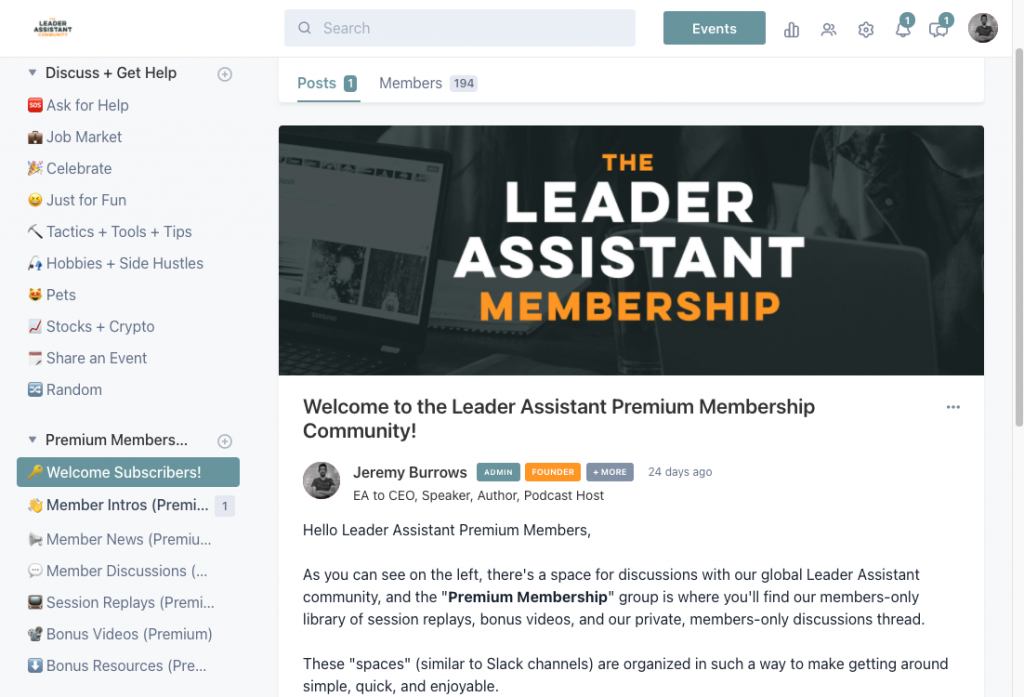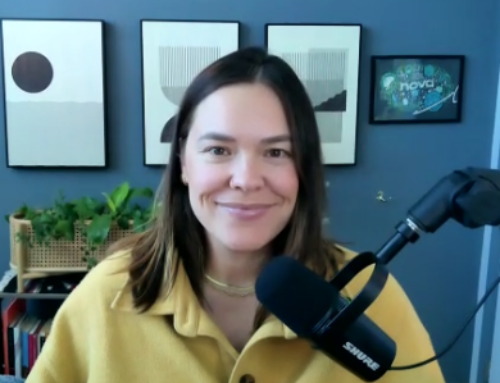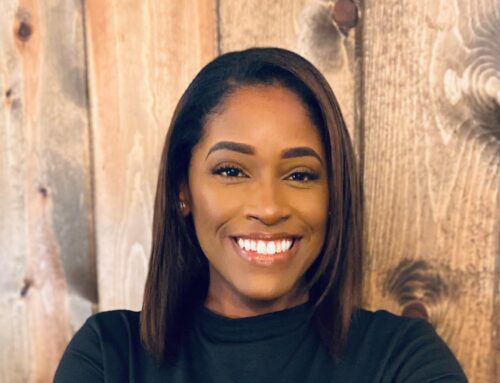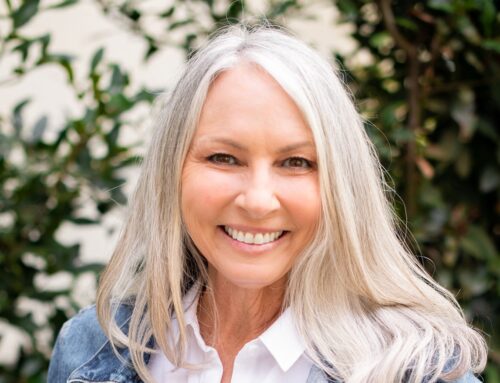Valerie Gagliano is a mom of two teenagers, wife, and has extensive executive and personal assistant career experience in multiple industries. She’s currently executive assistant to Gary Vaynerchuk, CEO of VaynerMedia.
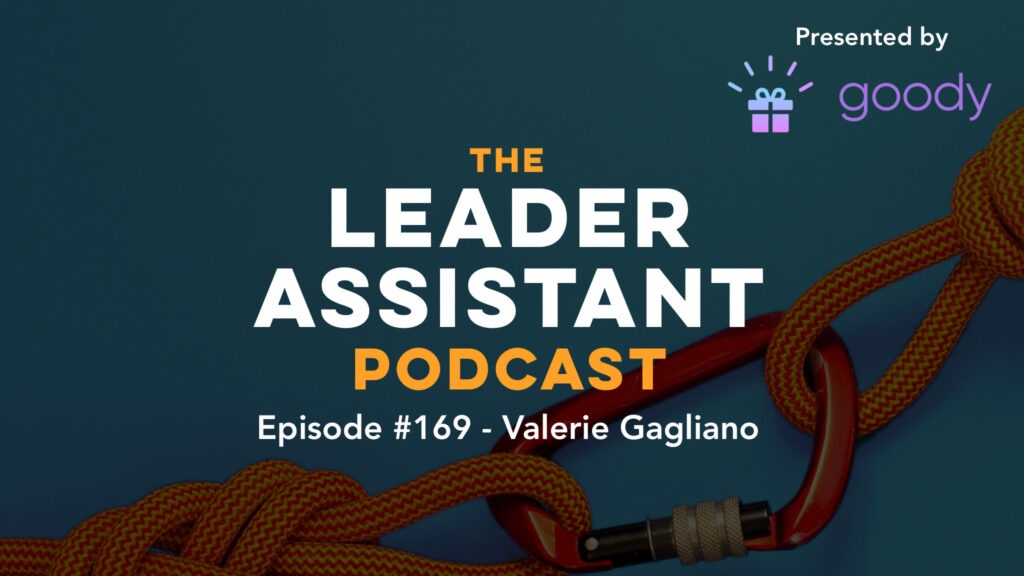
In this episode of The Leader Assistant Podcast, Valerie talks about managing an executive’s high volume of inbound requests, how to say “no” in a professional and kind way (“polite, concise, and professional”), working with an executive that values your contributions, the importance of a routine when working from home, and more.
As a bonus, Valerie took the opportunity to put the spotlight on me in this episode, and she asked me a few questions about how I become an EA, why I wrote a book, and more. 🙂
LEADERSHIP QUOTE
Leader Assistants possess the confidence to make considerate and informed decisions that lead to fruitful actions–in the absence of executive presence.
– Kristi D., EA in San Jose, CA (Quoted in Chapter 3 of The Leader Assistant)
CONNECT WITH VALERIE
ABOUT VALERIE
Valerie Gagliano is a mom of two teenagers, wife, and has extensive executive and personal assistant career experience in multiple industries. She’s currently executive assistant to Gary Vaynerchuk, CEO of VaynerMedia.
THE LEADER ASSISTANT PODCAST IS PRESENTED BY GOODY
A special thanks to my sponsor, Goody!
If you send business gifts to employees, clients or sales prospects, Goody is a game changer. You can send one gift or hundreds at the same time, without ever worrying about shipping details. With Goody, your gift recipients provide all their shipping info, and they can even swap out your gift for another option if they prefer. It’s free to start gifting and you get a $20 credit when you sign up. Oh and if you mention you heard about Goody on The Leader Assistant Podcast, Goody will add an extra $10 credit to your account.
Go here to start gifting today!
THE LEADER ASSISTANT PREMIUM MEMBERSHIP
To learn more about how you can join the now 200+ growth-minded Leader Assistants, check out our Leader Assistant Premium Membership for ongoing training, coaching, and community.
THE LEADER ASSISTANT BOOK
Download the first 3 chapters of The Leader Assistant: Four Pillars of Game-Changing Assistant for FREE here or buy it on Amazon or Audible.
LEADER ASSISTANT LIVE EVENTS
Check out our constantly updated schedule of events for admins and assistants at LeaderAssistantLive.com. Including our all-day, online leadership workshop at leaderassistantlive.com/workshop.
JOIN THE FREE COMMUNITY
Join the Leader Assistant Global Community here, or the Facebook Group here for bonus content and to network with other assistants who are committed to becoming leaders!
SUBSCRIBE
Subscribe to The Leader Assistant Podcast so you don’t miss new episodes!
You can find the show on Apple Podcasts, Spotify, Google Podcasts, Pandora, and Stitcher.
Join my email list here if you want to get an email when a new episode goes live.
LEAVE A REVIEW
If you’re enjoying the podcast, please take 2 minutes to rate and review the show on Apple Podcasts here. Each review helps me stay motivated to keep the show going!
—
EPISODE TRANSCRIPT
Valerie Gagliano 0:00
Hi, I’m Valerie Gagliano. Today’s executive assistant quote comes from the leader assistant book by Jeremy Burrows. Leader assistants possess the competence to make considerate and informed decisions that lead to fruitful actions in the absence of executive presence.
Podcast Intro 0:22
The Leader Assistant Podcast exists to encourage and challenge assistants to become confident game changing leader assistants.
Jeremy Burrows 0:33
The Leader Assistant Podcast is exclusively brought to you by goody which provides effortless gifting for all occasions. If you’re tired of sending tacky impersonal business gifts, then you should definitely check out goody my friends at goody offer a collection of hundreds of curated brands like Levain bakery, Thera body, milk bar, and Ember mugs. With goody, if your recipient doesn’t like your gift, they can swap it out for one they do like you can find perfect gifts for any occasion. Whether it’s work anniversaries, birthdays, new hire onboarding or company swag. It’s free to start gifting and you get a $20 credit when you sign up. Also, be sure to mention The Leader Assistant Podcast when signing up and goody will add an extra $10 credit to your account. So go to leaderassistant.com/goody to disrupt the inefficiencies in your team’s gifting strategy. Again, that’s a leaderassistant.com/goody Hey friends, this is Jeremy Burrows, host of The Leader Assistant Podcast you’re listening to Episode 169 and today I’m speaking with Valerie Gagliano. Valerie is executive assistant to Gary Vaynerchuk, CEO of Vayner. Media. Valerie, how’s it going?
Valerie Gagliano 1:57
I’m well, thank you. How are you? Jeremy? I’m happy to be on the show.
Jeremy Burrows 2:01
Yeah, glad to have you. I’m doing well. And what part of the world are you in?
Valerie Gagliano 2:06
New Jersey?
Jeremy Burrows 2:07
New Jersey? Nice. And are you from that area? Or are you? Yes?
Valerie Gagliano 2:11
Born and raised?
Jeremy Burrows 2:13
Okay. Awesome. Well, why don’t you tell us a little bit about your journey toward becoming an assistant. So did you know you want to be an assistant? Did you fall into the role? How did that all begin?
Valerie Gagliano 2:29
I feel like it’s a combination of both. I attended Grace Institute, which is a nonprofit business college. For women of any age at any point in their life. I attended right out of high school. And I had an idea of wanting to work in either a corporate setting or for an attorney, but wasn’t sure of the right direction wasn’t sure if a four year college was something that I wanted to pursue. And at that time, Grace Institute offered the opportunity to women to attend this college and you can do it on a yearly basis. And I graduated with an Associates in Business Administration. And at the end of it before graduation, they would take you on site to law firms in the city or other places of work and just have you interview and get a feel for a day in the life of real world of being an assistant in many different areas. And I started working for a law firm. And it was very rigid, very corporate. And I kind of got a sense for okay, maybe I don’t want it to be so rigid. Maybe I want to step away from the city for a little work in New Jersey, be closer to home, you know, look into start raising the family and things kind of just transpired where I was able to always keep my skill set up by working for many different companies, whether it was pharmaceutical advertising, cybersecurity, biotechnology, and it just evolved over time where I developed a knack for just being very thorough and very on top and keeping that executive up to date of what was happening. Minute day week. And I just enjoyed it more and more and each position that I’ve had I always As you know, try to emphasize it with learning more about the executive learning more about the company itself. And not just being a nine to five, you know, into the phone and to the emails being more involved really being the strategic business partner to the executive, which is where the role has evolved to more and more throughout the years. And I think it’s very rewarding and humbling in a sense to see how the position has evolved and how an assistant can be appreciated. At any level, whether they’re entry or they’re seasoned. And, you know, I think I really just I’m very appreciative to the opportunity that grace Institute has provided me, they were definitely the stepping stone.
Jeremy Burrows 6:07
Okay, so once you get in to the assistant career, how you mentioned like, over time, it seems that the role has garnered more respect, in general, but how did you see that in your different roles, so like, it looks like I’m looking at your, your LinkedIn and your in your history, you’ve got a lot of different interesting experience, and it looks like even different industries, with different you know, Chief Marketing Officers, CEOs, VP, General Counsel CFOs. So as you kind of got into all the different areas and different executives, did you find that you are drawn more to different departments or different industries,
Valerie Gagliano 7:02
I feel that as each opportunity presented itself, I was more drawn to learning more about that industry and learning about the executive or the executive team. Each industry is completely different, that I’ve had the chance to work in so learning the ins and outs, you know, cybersecurity, biotechnology, marketing, what it takes to put all the backwards into the pitch and the events. And the social media aspect of it, right, which has evolved significantly, over time has always been intriguing. And I think that that’s where, you know, working at VaynerMedia now specifically, is interesting. And its own right, because I’m having the opportunity to be mentored by the executives there while working alongside Gary and really just getting to understand what it takes to build social media.
Jeremy Burrows 8:34
Yeah, cuz, you know, back in your early career, there was probably no social media in your job description, right.
Valerie Gagliano 8:44
Right now? No, there wasn’t. It was more geared towards corporate. Like I said, you know, I worked for a couple of attorneys, and even just, you know, working at a pharmaceutical advertising company, in the very beginning, it was more corporate, the social media aspect was not so much. I think introduced to the assistant, it was more left to, you know, an executive vice president or a marketing vice president or manager and I think that what I have learned and what is what I’ve liked to see over the years is that the assistant is getting more involved and you’re sitting more in on meetings and not just to, you know, sit there and take notes, but to learn and grow with the company. And I think that that’s what is really important to me, I don’t just want to be the assistant that is answering your emails and just booking your travel. I want to be involved and I, you know, would want to be able to think like my executives think for my executive learn about the company really understand what we’re doing on a daily basis. Yeah.
Jeremy Burrows 10:14
Well, you know, it’s excited to talk with you, for a variety of reasons. But one of which is, you know, Gary Vaynerchuk, for those of you listening who don’t know, has a pretty big, pretty big social media presence, pretty big YouTube presence, very involved in, you know, investing, and media and all that fun stuff. And so I guess my point is, I can’t I can’t even imagine the number of inbound requests that he gets, you know, Instagram, DMS, LinkedIn, emails, all those different things. And you know, Valerie, I’m sure you’re the gatekeeper, or the gateway, or whatever you want to call it for many of those. So how do you handle and manage the mass quantity of requests?
Valerie Gagliano 11:14
I think that it works well, because we have a team that assists Gary. So there’s four of us working directly with him to receive and respond on his behalf with all of these inbound requests. And the good thing is the communication that we have between each other as a team and with Gary, to make him aware of what’s coming in, discuss with him the importance, and basically, sometimes just presenting the decision of we think x is going to take precedence over y, let us know your thoughts. And then from there, we make it happen. And there’s really not much pushback, because the wheels are turning in a way that we’re all on the same wavelength. And it just works in a sense of, we understand the priorities for him. And so we come together as a team before we go over his schedule, or we go over the requests that came in, in an email or through social media, and just gather as much information as possible for him. I think that I mean, I think I know that is the most important, key way of success with your executive is to gather as much information as possible. And I’m sure you do the same with your CEO that you don’t want to just bring, you know, a very vague, inbound email, you want to do the research, you know, you want to present them with the information to say, is it a cold call? Is it really a matter of a business key factor? Is it going to bring the company money? You know, what’s the importance of it? How can we make it work with everything else that has been coming in? That is just some important, you know? So we work together as a team to feel this information to him. And that’s really what makes the wheels run every day.
Jeremy Burrows 13:34
Yeah. That’s great. So how do you say no to requests in a kind way? Do you have templates that you could share? I know a lot of assistants are, you know, dealing with a lot of requests, and they have a hard time saying no, in the first place. But even just having different language to use when declining requests? Yeah, I
Valerie Gagliano 13:57
think you have to keep it very polite, concise and professional, in the sense that every request is on a different like basis in the sense that you can’t always respond the same to everyone. Maybe someone else needs a little bit more hand playing White Glove response. So I’ve always tried to just handle it on as needed basis in the sense that if I’m responding, and it’s not something that he wants, just to very tactfully, but sternly, politely you know, decline but still, almost in the sense that you’re saying, We’ll reach back out to you later, this could be an opportunity later down the line. We’ll revisit this in the coming months is something that you’re not completely shutting them down, unless, you know, the individual or the company seems to be I mean off, you know, in an indirect manner that just make sure you have to shut it down with, say, leave your legal department, you know, and you never want to get to, to that direction, but you want to just politely declined, you could maybe use as per your executive or, you know, at this time we will not be pursuing, you know, this connection or at this time, we will not be pursuing this call, we will, you know, reach out to you. In the coming months, you know, when you could say your executive is ready to redress the question or the situation, I think, you know, you just have to tactfully take it on an as needed basis.
Jeremy Burrows 15:52
Yeah. Yeah, that makes sense. So, I was trying to look it up. And, you know, it’s kind of hard to find it. I know, Gary posts a lot of content and a lot of different channels. And so I couldn’t find the exact quote, but I remember there was a maybe as an Instagram post, or, you know, LinkedIn post or something back a while back. And basically, it was something along the lines, Gary had had said something about how valuable an assistant is, and executive assistant is, or a personal assistant. And again, I can’t remember the exact quote, but I remember being like, Yeah, that’s right, preach Gary preach, because a lot of executives, obviously follow him. And I was excited to see his support for the executive assistant role. So I wanted to ask you, you know, you’ve worked with a lot of executives over the years, what’s it like working for an executive who understands the value you bring, versus the executives that are just kind of like, you’re just doing what I tell you?
Valerie Gagliano 16:56
Right? It’s, for me, because I’ve been there a little over a year now. It is the first company of the first executive that makes you genuinely feel like you are valued. So he is very true to his word. And what you heard him say, it’s along the lines of black and white, you know that there does not need to be any, like your hands held, but you understand, over time, his way of thinking and the company’s way of thinking. And it flows very nicely in the sense that everybody is humbled and happy to work together. And the vision is all in you, everyone understands the vision, and everyone genuinely cares about each other. I have to also say that the Chief Heart Officer Claude, I don’t know if you’ve ever had a chance to speak with her. But she is in fact, amazing. And also one of his right hands in the sense that she has the pulse of the company, and you just feel a sense of belonging and understanding. And not just it’s, you know, just do this for me. And this is why I said it, you know, he will take the time to explain to what he needs, what his thought processes, how it can all work together. And we’ll encourage you to meet with other executives in the company. If you want to learn about a certain product or clients that the agency has just brought on, we have a mentorship program, he’s very much about that. So I would have to say, for the first time in my life, and that’s what made me apply over a year ago, even though we were in the pandemic mode still. And all home all the time was how he does speak and that it’s his vision is true to how he is every day. It’s not sugar coated. So what everybody else sees in a podcast or other than Ben that he’s speaking at is how he is in the office. And I think that’s very comforting. That would make anyone I think, want to work. I’ve been there.
Jeremy Burrows 19:18
Right? Yeah, that’s great. What’s your number one tip for working remotely.
Valerie Gagliano 19:23
I like both telling you the truth. I feel very lucky to have been able to work remote as long as I have, in the sense that when you have a family, I think it makes it a lot easier. My number one tip would be to don’t lose sight of your routine that you did when you went into the office every day in the sense that you should get up you should get yourself ready. And just try to feel good about yourself. So you know, not every De is, are you going to feel 100%, but you don’t also want to just hang out and not have yourself put together and ready for the day. So I try to always stay true to I’m gonna get off, I’m gonna get myself ready. And that, you know, we’re gonna have a good day. Right? And just keep interacting with the team and be focused and whether we were remote or we go in, let’s go about it the same way.
Jeremy Burrows 20:36
Yeah, yeah, it’s such an important, you know, there’s a, there’s like a physical element to where, you know, you sit at a certain desk to do your work, versus a different desk to maybe eat your lunch. And it, it really changes your mindset. And you get to in the zone, if you have those different segmented physical spaces even.
Valerie Gagliano 21:01
Right. And I think too, when you’re working remote, you have to, I mean, and I’m, you know, at fault for this, you could sit at your desk and not move, because you’re not commuting, your, you know, you’re not rushing to the bus or your to your car to the train, you’re waking up and getting your cup of coffee, and you’re sitting down at your desk and you start working. And I you know, I’m, I’m a culprit to that, by default, sometimes where that happens. But just to remind yourself, get up, take that break, go have your lunch, maybe go for a walk. Because when you’re in the office, you have more than interaction of you know, you’ve went to go get your cup of coffee, and you stopped to talk to a co worker, and then you were able to walk back to your desk. And it’s different when you’re remote because you don’t have that interaction. So I think that, you know, taking if you have to set an alarm, even at an offset, this is something that you’ve recognized to Germany, and, you know, going for that walk to take that break, I think is important.
Jeremy Burrows 22:07
Yeah, I agree. I try to take, you know, a walk at lunch, or even just walk around in circles in my basement if the weather’s nasty.
Valerie Gagliano 22:15
Right, right, just to get some motion and try to feel like a normal routine, in a sense, because I feel like the new normal is hybrid. And I think that it’s important also for employers to recognize that and not penalize their employees for that, because everybody’s priorities have changed through COVID. And, you know, it’s not something that’s going away. So I think for executives and companies just to be more cognizant, and aware of, you know, if my employee is able to perform remotely, and they’re not comfortable coming in five days a week, then work something now, where in a sense, maybe they’re into and home three, you know, or every other or something, I just think that the flexibility of that is something long term for executives and companies to recognize. That’s, that’s my help. Yeah,
Jeremy Burrows 23:24
definitely. Yeah. Well, Valerie, thanks for sharing your story. When you reach out to me about the podcast, you also mentioned that you had a few questions for me. So I was going to hand the mic over to you and that you interview me?
Valerie Gagliano 23:38
Yes, that would be great. Um, what made you choose, you know, the EA life you’d like? Have you how you asked me? Was it something that you always knew? Or did you fall into it? Or what has been your experience so far?
Jeremy Burrows 23:52
Yeah, that’s a great question. So what I when I was, early on in my career, I essentially kind of fell into it in the sense that I was doing I was working at a nonprofit, church organization, and I was doing music and I was really all excited about doing music and want to do music for my whole life. And then the organization outgrew my musical talent and abilities, this short way to say it. And so I started to figure out okay, well, if I’m not quite able to keep up with my music skills, are there other skills that I can, that I am keeping up with? And I over time I noticed that the organizational project management you know, punctuality all the all the detail oriented, all that stuff I was really good at and the people around me were not very good at it at all. And so I was like, okay, either these people are really, really poor at organization and and details, or I’m really good at it, or maybe a mixture of both. And so basically, I saw that my skills in that area, were actually outgrowing the organization. And so that helped me. See, okay, wait, this, maybe this is actually, my, my strengths and my you know, whatever you want to career path calling whatever you want to call it. And so I leaned more into, alright, let’s, let’s do the things I’m really good at. And I’m the best at in my circle. And as I did that, it just, it just kept growing and growing and growing. And I just, I never felt like the organization was too complex, or the executive assistant to the founder role was, it was definitely challenging and difficult, and just seasons of really hard, hard times. But I never felt like oh, I can’t do this, like, I can’t, I can’t grow and keep up or stay ahead of the pace. So that’s kind of how I leaned into it. And then I read an article in the Harvard Business Review from Melba Duncan about the value of executive assistants. And it was breaking down even like the the monetary value, as she was arguing to executives, basically saying, Hey, this is how much money can executive assistant is worth, and you can save you. And that’s what I was like, Okay, this is actually a career. So that’s the, that’s the short version of how I chose the EAA life or how it chose me.
Valerie Gagliano 26:46
Yeah, that’s, that’s very intriguing and comforting in the same breath, because I had the pleasure of meeting Melba a couple of years ago, and she is someone that I look up to, because I felt the same way, when you’re saying on the article that she wrote, she is definitely someone who will fight for an executive assistants worth. And I think she has definitely paved the way for us in a sense that it also doesn’t have to be geared towards just women, which I think it’s amazing. You can start it basically, at any point in your life, you know, and the and the drive, and the willingness to learn, and then be open to the possibilities are endless. And, you know, I think that for for people like you and Melba, to bring that to the attention of, you know, to other executives in the world is where it needs to be, and we need to have more podcasts and more posts. And I don’t know whether it’s like, you know, we go in there with a sign that fire this EA because this is what she would she’s worth and she will, you know, bring your life so much more ease. Whatever it takes, really. Yeah, I agree. What decide what made you decide that you wanted to be a mentor and a coach as well?
Jeremy Burrows 28:34
Well, I, you know, when I was in between roles, my prior executive had gotten fired, and it kind of like, was a shock to my career and my life, because I was like, Oh, I think I think I’m gonna be here forever and support this executive forever. And things changed, literally overnight. And so I decided to take a break, hit reset, kind of look at how my life was going. And I realized I was burned out and not in a healthy position. And so I took that time off, and I decided I don’t want to burn out and I don’t want my executive to burnout again, but then I, you know, I’m a helper. I like helping other people as part of why I’m gonna get an assistant. And I just thought, Okay, it’s not just about me, avoiding burnout, or my helping my executive resist burnout. It’s, it’s got to be more than that, like, I want to help as many assistants in the world and as many executives in the world as I can avoid burnout and resist burnout. And so, that’s what kind of got me to thinking, Okay, I’m gonna learn my lesson. I’m gonna document what I learned. All the mistakes I made my executive made, and just try to help as many citizens and executives as possible and so that’s kind of the Jumpstart, and I just started blogging sort of LinkedIn networking, started reaching out and to other assistant trainers or coaches or speakers or whatnot. And really just tried to put myself out there and just again, share the mistakes that I made, and the lessons that I learned in hopes that they would help other assistants. And then over time, I got feedback on Hey, this is really helpful. You know, this, this is, you know, say that again, you know, share it with people sharing my, my thoughts. And so that’s when I decided, you know, okay, I guess I guess what I’m doing is helping others. And so I should try to do that more. And so that’s kind of how I fell into coaching, and speaking and training and all that. And then why I decided to write a book, it was because I was having the same conversations over and over again, with different assistants. And I thought, Okay, this isn’t really going to scale like this isn’t me to having one on one conversations with assistants isn’t going to help as many assistants as possible. And so that’s why I decided to put all my ideas and thoughts and lessons in my book. And that way, I could actually reach more assistants and more executives, without, you know, being on one on one calls all day every day.
Valerie Gagliano 31:27
Right? Do you feel that executives? Do you lean into the book or the podcast? Or has it only been assistants?
Jeremy Burrows 31:37
Definitely they do. I would say, obviously, the majority are assistants. But I’ve heard from dozens of executives that say, Hey, I, you know, heard your podcast, or I read this article, or I got your book for my assistant, and we’re going through it together. So yeah, I definitely see the value or on the flip side, the assistants are taking what they learned to their executives, like one of my favorite stories is a couple of assistants actually ping me about this, but they got the book. And in the calendar chapter, I talked about this ideal week template and this tactic that I use, where you set up blocks and an ideal week for your executive. And they said, Oh, you know, I went over the idea we can book and I thought it was awesome. So I took it to my executive, we walked through it, we set it up. And they were just so excited. And they’re like, this is this is game changing this idea. We think it’s game changing. And then I was like, well, that’s on the on the cover of the book. So point in gonna be a game changing assistant. So yeah, it’s it’s, it’s, it’s been awesome to see how it has benefited executives. But yes, mostly, mostly assistants.
Valerie Gagliano 32:53
That’s, that’s really comforting, because for a second, I thought it was just assistant. So it’s really nice to hear that you also have the executives leaning in as well, and working with their EA and really taking, you know, the knowledge that they’re bringing them and the suggestions and running with it. Because I mean, as an assistant, you are there to make their life easier. So I think that if they truly respect their assistance, they’ll take the time, you know, to listen and work together, which is really great.
Jeremy Burrows 33:31
Yeah, and, you know, I actually am writing a workbook, I’m just just finishing it now. And the workbook has a section for each chapter that’s literally called Lead your executive. And so it’s it’s a prompt or question. It’s like questions to ask your executive or prompt on how to work with your executive to apply what you learned in that chapter. So I’m all about like, don’t just, you know, passively consume this content, but do something with it.
Valerie Gagliano 34:04
Ya know, that’s, that’s the key. That is definitely the key. You can’t just talk about it. You have to be able to apply it every day.
Jeremy Burrows 34:14
Awesome, Valerie. Well, thanks for interviewing me. That was fun. And thanks for letting me interview you. Best of luck to you and your career where where can people reach out if they want to say hi and connect?
Valerie Gagliano 34:26
Yes, thank you for the time as well and I can be reached via LinkedIn under Valerie Gagliano. I’m happy to discuss our interview and how we were able to connect and any questions about the day in the life that I lead every day as an assistant and my experience over the years. So thank you very much, Jeremy.
Jeremy Burrows 34:49
Awesome. Well, I’ll put the link in the show notes leaderassistant.com/169. And thanks again and we’ll talk soon.
Valerie Gagliano 34:58
Thank you have a good Every day
Jeremy Burrows 35:10
please review on Apple podcasts goburrows.com

